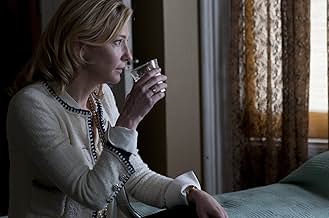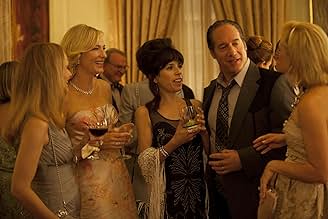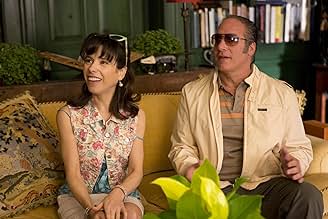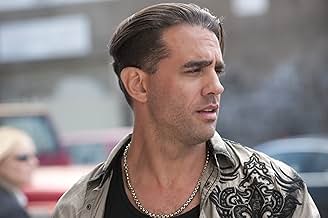La película de una mujer, en bancarrota tras el suicidio de su marido, un financiero adinerado. Jasmine tiene que mudarse con su hermana, pero no puede olvidar la vida lujosa que una vez tuv... Leer todoLa película de una mujer, en bancarrota tras el suicidio de su marido, un financiero adinerado. Jasmine tiene que mudarse con su hermana, pero no puede olvidar la vida lujosa que una vez tuvo.La película de una mujer, en bancarrota tras el suicidio de su marido, un financiero adinerado. Jasmine tiene que mudarse con su hermana, pero no puede olvidar la vida lujosa que una vez tuvo.
- Dirección
- Guionista
- Elenco
- Ganó 1 premio Óscar
- 56 premios ganados y 83 nominaciones en total
- Dirección
- Guionista
- Todo el elenco y el equipo
- Producción, taquilla y más en IMDbPro
Opiniones destacadas
If you want to see this year's master class in screen acting, you need to watch Cate Blanchett's mesmerizing performance as Jasmine French, a delusional Park Avenue socialite wife in Woody Allen's 45th directorial effort, a sly, bicoastal update of Tennessee Williams' classic "A Streetcar Named Desire". As the film opens, her impeccably dressed character has hit rock bottom after her financial wizard of a husband is arrested and her assets are liquidated. In the throes of a nervous breakdown, she arrives in San Francisco and moves in with her kind- hearted sister Ginger who lives a modest, blue-collar life in a tiny apartment on the edge of the Mission – on South Van Ness near 14th Street to be exact - with her two hyperactive sons. You can tell Jasmine is not only out of her element but quite judgmental about how her sister's life has turned out. The irony of Jasmine's patronizing attitude is that she is a habitual liar who is so angry about her destitute circumstances that she frequently talks to herself. The story follows the basic outline of "Streetcar" but takes some interesting turns, for instance, when she tries to better herself by taking computer classes while working as a receptionist at a dental office.
Allen has crafted his film into a clever juxtaposition of current and past events that feels jarring at first since it reflects Jasmine's precarious mental state but then melds into a dramatic arc which resonates far more than a straightforward chronology could have allowed. As a writer, he has become more vociferous in his dialogue without losing his wit. He doesn't pull punches when he showcases confrontations between his characters, whether it's between the two sisters, men and women, or people from different classes. Hostility can come in flammable torrents or in thinly veiled remarks. That Allen moves so dexterously in tone is a testament to his sharp ability in drawing out the truth in his actors. Blanchett is a wonder in this regard because there is something intensely fearless in her approach. Unafraid to lose audience sympathy for her character, she finds an innate sadness in Jasmine that makes us want to know what happens to her next. She also mines the sharp, class- based humor in Jasmine's struggles with one highlight a hilariously executed scene in a pizza restaurant where she explains to her confused nephews to "Tip big, boys".
The rest of the cast manage effective turns. Alec Baldwin plays Jasmine's swindler husband with almost effortless aplomb. Sally Hawkins brings a wonderful looseness to Ginger, Stella to Blanchett's Blanche, and finds a level of poignancy in her character's constant victimization at the hands of her sister as well as her brutish, blue-collar boyfriend Chili, played with comic fierceness by Bobby Cannavale in the Stanley Kowalski role. In a conveniently conceived role, Peter Sarsgaard gets uncharacteristically breezy as Dwight, a wealthy, erudite, and matrimonially available State Department diplomat who appears to be the answer to Jasmine's prayers, while Allen casts two unlikely comics in about-face roles – Andrew Dice Clay as Ginger's defeated ex-husband Augie and Louis C.K. as Al, an amorous suitor who brings Ginger a few moments of romantic salvation. Allen's European sojourn appears to have freed him up with the movement of characters in scenes and Javier Aguirresarobe's ("Vicky Cristina Barcelona") camera-work complies nicely. The San Francisco locations bring a nice geographic change to Allen's storytelling, and he only uses the Golden Gate Bridge in a long shot once from the Marin side. This is Allen's best work in quite a while, and Blanchett is the ideal muse for his tale.
Allen has crafted his film into a clever juxtaposition of current and past events that feels jarring at first since it reflects Jasmine's precarious mental state but then melds into a dramatic arc which resonates far more than a straightforward chronology could have allowed. As a writer, he has become more vociferous in his dialogue without losing his wit. He doesn't pull punches when he showcases confrontations between his characters, whether it's between the two sisters, men and women, or people from different classes. Hostility can come in flammable torrents or in thinly veiled remarks. That Allen moves so dexterously in tone is a testament to his sharp ability in drawing out the truth in his actors. Blanchett is a wonder in this regard because there is something intensely fearless in her approach. Unafraid to lose audience sympathy for her character, she finds an innate sadness in Jasmine that makes us want to know what happens to her next. She also mines the sharp, class- based humor in Jasmine's struggles with one highlight a hilariously executed scene in a pizza restaurant where she explains to her confused nephews to "Tip big, boys".
The rest of the cast manage effective turns. Alec Baldwin plays Jasmine's swindler husband with almost effortless aplomb. Sally Hawkins brings a wonderful looseness to Ginger, Stella to Blanchett's Blanche, and finds a level of poignancy in her character's constant victimization at the hands of her sister as well as her brutish, blue-collar boyfriend Chili, played with comic fierceness by Bobby Cannavale in the Stanley Kowalski role. In a conveniently conceived role, Peter Sarsgaard gets uncharacteristically breezy as Dwight, a wealthy, erudite, and matrimonially available State Department diplomat who appears to be the answer to Jasmine's prayers, while Allen casts two unlikely comics in about-face roles – Andrew Dice Clay as Ginger's defeated ex-husband Augie and Louis C.K. as Al, an amorous suitor who brings Ginger a few moments of romantic salvation. Allen's European sojourn appears to have freed him up with the movement of characters in scenes and Javier Aguirresarobe's ("Vicky Cristina Barcelona") camera-work complies nicely. The San Francisco locations bring a nice geographic change to Allen's storytelling, and he only uses the Golden Gate Bridge in a long shot once from the Marin side. This is Allen's best work in quite a while, and Blanchett is the ideal muse for his tale.
It's a great and unexpected surprise when Woody can beat both the Coens and the French these days in a film about delusion and self. I'm not a fan of his overall trajectory and predilections, but I won't deny any film its effectiveness.
Woody here pierces through to the essential thing. It's a film about modern suffering but that is clearly seen here as attachment to internal narrative, not just a general thickness around being. He maintains inextricability; it is both her fault and a life of circumstance with no clean separation. The woman still carries echoes of that previous narrative around her, soon it becomes clear that the explanatory flashbacks are hallucinated after the fact.
Overall Woody here arrives at a tender admission. It would be all too easy to discard or condemn her as pampered and sheltered, this is only part of the thrust here. He doesn't romanticize privilege the way Sofia Coppola is prone to, another plus: we're called to sympathize with more than a victim. The admission is that life in its course of being lived leaves indelible marks in the story of who you are, that this is only real to the extend that you inhabit the story, and yet that's it's genuinely hard to distinguish one self from the other.
He doesn't give this internal world to us with particular visual richness, few filmmakers his age do. There is 'color and shape', tied to the narrator's vivid imagination who aspires to be an 'interior designer', but Woody could have done so much more with the logic of memory. No, the real effect here is geared in the combination of asking the multilayered Blanchett to inhabit a character who inhabits and continuously recalls a story. She's marvelous. She seems to know the degree to which Jasmine blurs the recalled story to be only about color and appearances is the same one to which she blurs the current one, true love from convenience, responsibility from mere absent-mindedness, all these Blanchett truly, genuinely blurs around the character she inhabits.
It's deceptively easy to consume this thinking Jasmine knew in advance or was never in love, be aware and sensitive to this difference. It blooms once you reflect back on it, inhabit her world instead of pass through with moral superiority, because doing this means that your own tools of defining truth must be called into judgement.
It's a fine film, much better than the hollow inhabiting of his Midnight. This one cuts. A Woman Under the Influence appears to have been a template, Jasmine's muttering to herself on the street is a reference. Like that film, it is as much the filmmaker's as the actresses' creation, impossible without the richness Blanchett fleshes with.
Woody here pierces through to the essential thing. It's a film about modern suffering but that is clearly seen here as attachment to internal narrative, not just a general thickness around being. He maintains inextricability; it is both her fault and a life of circumstance with no clean separation. The woman still carries echoes of that previous narrative around her, soon it becomes clear that the explanatory flashbacks are hallucinated after the fact.
Overall Woody here arrives at a tender admission. It would be all too easy to discard or condemn her as pampered and sheltered, this is only part of the thrust here. He doesn't romanticize privilege the way Sofia Coppola is prone to, another plus: we're called to sympathize with more than a victim. The admission is that life in its course of being lived leaves indelible marks in the story of who you are, that this is only real to the extend that you inhabit the story, and yet that's it's genuinely hard to distinguish one self from the other.
He doesn't give this internal world to us with particular visual richness, few filmmakers his age do. There is 'color and shape', tied to the narrator's vivid imagination who aspires to be an 'interior designer', but Woody could have done so much more with the logic of memory. No, the real effect here is geared in the combination of asking the multilayered Blanchett to inhabit a character who inhabits and continuously recalls a story. She's marvelous. She seems to know the degree to which Jasmine blurs the recalled story to be only about color and appearances is the same one to which she blurs the current one, true love from convenience, responsibility from mere absent-mindedness, all these Blanchett truly, genuinely blurs around the character she inhabits.
It's deceptively easy to consume this thinking Jasmine knew in advance or was never in love, be aware and sensitive to this difference. It blooms once you reflect back on it, inhabit her world instead of pass through with moral superiority, because doing this means that your own tools of defining truth must be called into judgement.
It's a fine film, much better than the hollow inhabiting of his Midnight. This one cuts. A Woman Under the Influence appears to have been a template, Jasmine's muttering to herself on the street is a reference. Like that film, it is as much the filmmaker's as the actresses' creation, impossible without the richness Blanchett fleshes with.
"Blue Jasmine" is a Drama movie in which we follow Jasmine, a once-wealthy New York socialite who struggles to cope with a dramatic fall from grace after her husband's financial scandal.
I found this movie interesting and emotionally intense, since it explore themes like loss, delusion, and personal unraveling. The interpretation of Cate Blanchett who played as Jasmine was extraordinary and the undeniable highlight of the movie. She delivered a captivating portrayal of a woman slowly descending into madness, while the contrast between her past extravagant life and her current crumbling reality created a compelling narrative. I believe that Cate Blanchett made one of her best performance if not her best, something that engaged the audience. The direction which was made by Woody Allen was very good and he brought out strong interpretations from the entire cast. All in all, I have to say that "Blue Jasmine" is an amazing movie and I strongly recommend everyone to watch it.
I found this movie interesting and emotionally intense, since it explore themes like loss, delusion, and personal unraveling. The interpretation of Cate Blanchett who played as Jasmine was extraordinary and the undeniable highlight of the movie. She delivered a captivating portrayal of a woman slowly descending into madness, while the contrast between her past extravagant life and her current crumbling reality created a compelling narrative. I believe that Cate Blanchett made one of her best performance if not her best, something that engaged the audience. The direction which was made by Woody Allen was very good and he brought out strong interpretations from the entire cast. All in all, I have to say that "Blue Jasmine" is an amazing movie and I strongly recommend everyone to watch it.
"Who do you have to sleep with around here to get a Stoli martini with a twist of lemon?"
Woody Allen has returned to the States for this film after experiencing some extended vacations over Europe (To Rome with Love, Midnight in Paris, You Will Meet a Tall Dark Stranger, and Vicky Cristina Barcelona), and this time the story takes place mostly in San Francisco, although we do get several interesting flashbacks in New York (Allen's favorite filming location). I mention these locations because in most of his films these cities are actual characters and sometimes even main ones. There were two general criticisms I had read about Blue Jasmine before watching it, one was that this was Woody Allen's return to form and the second was that Cate Blanchett's performance was magnificent. I agree with the second statement because Blanchett delivers one of the best performances of the year and she is the main reason why this film actually worked for me. As for the second statement I have to differ because I thought Midnight in Paris was his best recent film and I enjoyed it much more than Blue Jasmine. I do have to say that Woody Allen's capacity for writing and directing these films in such a short period of time (he's directed one every year for the past decades) impresses me. He has a unique voice in all of his films that sometimes make me picture him talking through each one of his characters. I remember something similar happening to me during college when I would be reading over my notes as I studied for a final exam actually listening to my professors unique voice in my head as I read. This is what happens to me often during a Woody Allen film as I imagine his head popping over one of his characters. It happened during this film as well, except for Blanchett's character who managed to bring her unique style which took a voice of its own. She deserves all the accolades she's been receiving from her peers and critics alike. It was a wonderful performance and an affecting one as well.
Jasmine (Cate Blanchett) was a New York socialite who lived a happy and blessed life with her husband Hal (Alec Baldwin), until he was sent to prison for fraudulent business acts. We get to discover some darker secrets about their past as the story unravels through flashbacks, but the film opens at the present as Jasmine is returning to San Francisco to live with her sister, Ginger (Sally Hawkins) and her two sons, completely broke. She has experienced several mental breakdowns due to her traumatic past, and despite being estranged from her sister during that time, Ginger takes her in. Jasmine imposes on Ginger who wasn't as blessed as she was and is working at a grocery store while dating Chili (Bobby Canavale). Jasmine and Chili don't get along too well as she has interfered in his plans to move in with Ginger. Jasmine is always telling her that she should find someone better like she did (which wasn't really the case) and that is the reason for the constant friction between them. In San Francisco, Jasmine meets another wealthy man named Dwight (Peter Saarsgard) who she begins dating, and which gives her hope that she will recover her past glory, but her constant lies begin catching up with her affecting her relationship with him and her sister.
I wouldn't say this is a character driven story because I felt a lot of them were one dimensional characters, with the exception of Jasmine of course. The people in Woody Allen's films don't tend to feel real or authentic at times, and they usually are just cartoonish caricatures from a bubbled world. Allen's films aren't the laugh out loud type either, I find them funny in a rather witty way. He is slick at times and the scenes put a smile on your face, but they don't have you laughing hysterically. Blanchett does manage to portray Jasmine in a more authentic and believable way, showing her flaws and inner struggles with her mental illness. It's a character that we find hard to sympathize with, but also feel sorry for as her life begins falling apart. She's the type of person who cannot be on her own and is always depending on someone. I also liked the way in which Woody Allen told the story and let the past unravel smoothly through flashbacks revealing several things about her character. This along with Blanchett's performance is what saves the movie and makes it entertaining, but I wouldn't agree with the critics who are saying this is Allen's best work in years. I do agree it is perhaps his most tragic and darkest comedy in recent years.
http://estebueno10.blogspot.com/
Woody Allen has returned to the States for this film after experiencing some extended vacations over Europe (To Rome with Love, Midnight in Paris, You Will Meet a Tall Dark Stranger, and Vicky Cristina Barcelona), and this time the story takes place mostly in San Francisco, although we do get several interesting flashbacks in New York (Allen's favorite filming location). I mention these locations because in most of his films these cities are actual characters and sometimes even main ones. There were two general criticisms I had read about Blue Jasmine before watching it, one was that this was Woody Allen's return to form and the second was that Cate Blanchett's performance was magnificent. I agree with the second statement because Blanchett delivers one of the best performances of the year and she is the main reason why this film actually worked for me. As for the second statement I have to differ because I thought Midnight in Paris was his best recent film and I enjoyed it much more than Blue Jasmine. I do have to say that Woody Allen's capacity for writing and directing these films in such a short period of time (he's directed one every year for the past decades) impresses me. He has a unique voice in all of his films that sometimes make me picture him talking through each one of his characters. I remember something similar happening to me during college when I would be reading over my notes as I studied for a final exam actually listening to my professors unique voice in my head as I read. This is what happens to me often during a Woody Allen film as I imagine his head popping over one of his characters. It happened during this film as well, except for Blanchett's character who managed to bring her unique style which took a voice of its own. She deserves all the accolades she's been receiving from her peers and critics alike. It was a wonderful performance and an affecting one as well.
Jasmine (Cate Blanchett) was a New York socialite who lived a happy and blessed life with her husband Hal (Alec Baldwin), until he was sent to prison for fraudulent business acts. We get to discover some darker secrets about their past as the story unravels through flashbacks, but the film opens at the present as Jasmine is returning to San Francisco to live with her sister, Ginger (Sally Hawkins) and her two sons, completely broke. She has experienced several mental breakdowns due to her traumatic past, and despite being estranged from her sister during that time, Ginger takes her in. Jasmine imposes on Ginger who wasn't as blessed as she was and is working at a grocery store while dating Chili (Bobby Canavale). Jasmine and Chili don't get along too well as she has interfered in his plans to move in with Ginger. Jasmine is always telling her that she should find someone better like she did (which wasn't really the case) and that is the reason for the constant friction between them. In San Francisco, Jasmine meets another wealthy man named Dwight (Peter Saarsgard) who she begins dating, and which gives her hope that she will recover her past glory, but her constant lies begin catching up with her affecting her relationship with him and her sister.
I wouldn't say this is a character driven story because I felt a lot of them were one dimensional characters, with the exception of Jasmine of course. The people in Woody Allen's films don't tend to feel real or authentic at times, and they usually are just cartoonish caricatures from a bubbled world. Allen's films aren't the laugh out loud type either, I find them funny in a rather witty way. He is slick at times and the scenes put a smile on your face, but they don't have you laughing hysterically. Blanchett does manage to portray Jasmine in a more authentic and believable way, showing her flaws and inner struggles with her mental illness. It's a character that we find hard to sympathize with, but also feel sorry for as her life begins falling apart. She's the type of person who cannot be on her own and is always depending on someone. I also liked the way in which Woody Allen told the story and let the past unravel smoothly through flashbacks revealing several things about her character. This along with Blanchett's performance is what saves the movie and makes it entertaining, but I wouldn't agree with the critics who are saying this is Allen's best work in years. I do agree it is perhaps his most tragic and darkest comedy in recent years.
http://estebueno10.blogspot.com/
What a treat! Cate Blanchett gives a stunning performance as a Blanche-like character written and directed by the most prolific American author of the last 40 years. Cate seems to be an actress without emotional borders. Jasmine walks a very tight rope, her sense of despair etched in her magnificent face vanishes ipso facto when she meets Peter Sarsgaard. She realizes in a sort of disbelief -extraordinary, heartbreaking and horribly funny moment - that he could be the rescue raft in her own personal tsunami. Sally Hawkins, another stroke of genius in the casting department, is a profoundly human creature very much the Stella of the situation. This two sisters, adopted both from different parents are also from different, if immediately recognizable, universes. I could go on and on but I'm not going to, I just wanted to urge you, in this times of 3D super extra loud marvel sequels, to run and see it.
¿Sabías que…?
- TriviaBecause Woody Allen doesn't get into motivation or background of a character when he's directing actors, Cate Blanchett and Sally Hawkins got together and invented the background for the sisters' relationship. So every scene when they talked about their past, although it's vague on the script and for the viewer, they both knew exactly what the sisters are talking about.
- ErroresWhen Ginger, Jasmine, Chili and Eddie are at the clams restaurant, Eddie asks Jasmine what would she be if she had finished her education. She answers, "An anthropologist". Eddie ignorantly asks, "Really, digging up fossils?" Jasmine replies mockingly: "That's an archaeologist". She is wrong. The correct answer would be, "That's a paleontologist". Jasmine is belittling Eddie for his ignorance, but she is in fact displaying ignorance herself.
- ConexionesFeatured in The Tonight Show with Jay Leno: Episode #21.188 (2013)
- Bandas sonorasBack O'Town Blues
Composed by Louis Armstrong & Luis Russell
Performed by Louis Armstrong and the All-Stars
Courtesy of The Verve Music Group
Under license from Universal Music Enterprises
Selecciones populares
Inicia sesión para calificar y agrega a la lista de videos para obtener recomendaciones personalizadas
- How long is Blue Jasmine?Con tecnología de Alexa
- Why exactly did Ginger divorce Augie?
Detalles
- Fecha de lanzamiento
- País de origen
- Sitios oficiales
- Idioma
- También se conoce como
- Blue Jasmine
- Locaciones de filmación
- Ocean Beach, San Francisco, California, Estados Unidos(Ginger and Al walking along the beach)
- Productoras
- Ver más créditos de la compañía en IMDbPro
Taquilla
- Presupuesto
- USD 18,000,000 (estimado)
- Total en EE. UU. y Canadá
- USD 33,405,481
- Fin de semana de estreno en EE. UU. y Canadá
- USD 612,064
- 28 jul 2013
- Total a nivel mundial
- USD 99,104,804
- Tiempo de ejecución1 hora 38 minutos
- Color
- Mezcla de sonido
- Relación de aspecto
- 2.35 : 1
Contribuir a esta página
Sugiere una edición o agrega el contenido que falta

Principales brechas de datos
What is the streaming release date of Jazmín Azul (2013) in Canada?
Responda
































